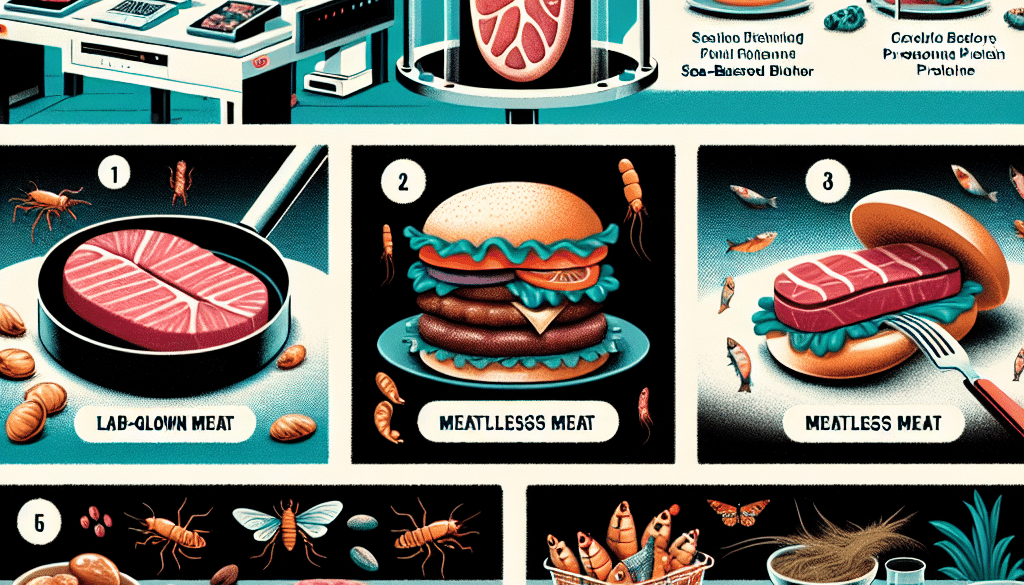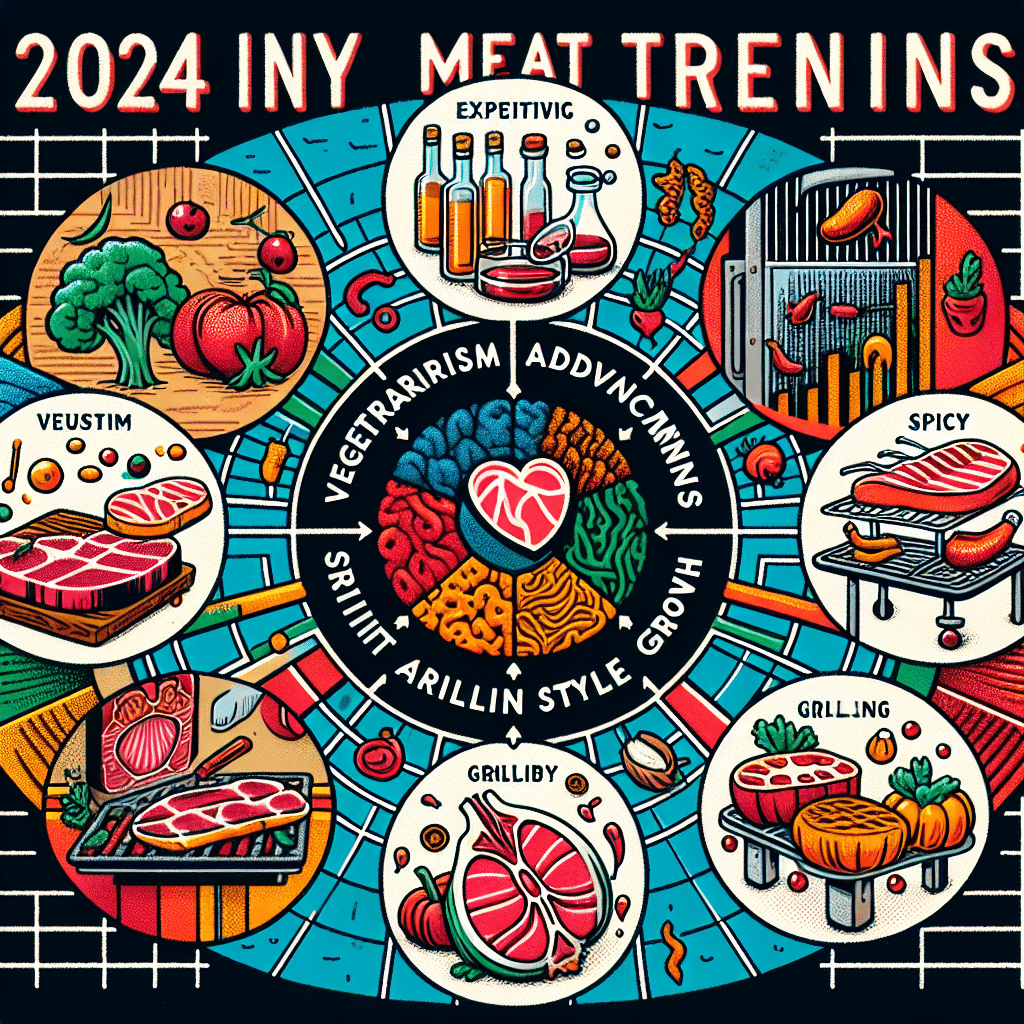7 Meat Trends for 2024
-
Table of Contents
- 7 Meat Trends Shaping the Future of Protein in 2024
- 1. Plant-Based Meat Alternatives Gain Momentum
- 2. Cultured Meat Breakthroughs
- 3. Regenerative Agriculture and Grass-Fed Meats
- 4. Ethical and Humane Animal Rearing
- 5. Meat Snack Innovations
- 6. Precision Fermentation and Mycoprotein
- 7. Local and Artisanal Meats
- Conclusion
- Discover ETChem’s Protein Products
7 Meat Trends Shaping the Future of Protein in 2024
The meat industry is constantly evolving, with new trends emerging as consumer preferences shift, technology advances, and sustainability concerns grow. As we look towards 2024, several key trends are poised to shape the future of protein consumption. In this article, we’ll explore seven meat trends that are expected to gain traction and influence the market in the coming year.
1. Plant-Based Meat Alternatives Gain Momentum
Plant-based meats have been on the rise for several years, and this trend is only set to continue into 2024. As consumers become more health-conscious and environmentally aware, the demand for meat alternatives that mimic the taste and texture of animal protein is growing. Brands are investing in research and development to create products that are not only more realistic but also more nutritious, with a focus on clean labels and whole-food ingredients.
- Expansion of plant-based options in fast-food chains and restaurants
- Increased availability of plant-based meats in grocery stores
- Advancements in texture and flavor to closely resemble animal meat
2. Cultured Meat Breakthroughs
Cultured meat, also known as lab-grown or cell-based meat, is expected to make significant strides by 2024. This technology involves growing meat from animal cells in a controlled environment, reducing the need for traditional livestock farming. While still in the early stages of commercialization, cultured meat has the potential to revolutionize the industry by offering a sustainable and ethical alternative to conventional meat production.
- Investments in scaling up production to lower costs
- Regulatory approvals paving the way for market entry
- Collaborations between startups and established meat companies
3. Regenerative Agriculture and Grass-Fed Meats
Regenerative agriculture practices that focus on soil health, biodiversity, and ecosystem restoration are gaining traction in the meat industry. Grass-fed meats from animals raised on pastures practicing regenerative techniques are becoming more popular as consumers seek out products that have a positive environmental impact. This trend is also driven by the perceived health benefits of grass-fed meats, which are often higher in certain nutrients compared to their grain-fed counterparts.
- Increased consumer demand for transparency and traceability
- More certifications and labels indicating regenerative practices
- Partnerships between farmers and brands to promote regenerative meats
4. Ethical and Humane Animal Rearing
Animal welfare concerns are influencing consumer purchasing decisions more than ever. In 2024, we can expect to see a continued push for ethical and humane rearing practices, with a focus on free-range, cage-free, and humanely raised certifications. Consumers are willing to pay a premium for meats that come from animals treated with care, leading to a rise in welfare-conscious brands and products.
- Growth in animal welfare certifications and labels
- Consumer education campaigns about humane rearing practices
- Increased scrutiny of animal welfare standards in supply chains
5. Meat Snack Innovations
The popularity of high-protein, convenient snacks is driving innovation in the meat snack category. In 2024, expect to see a wider variety of meat snacks, including exotic meats, novel flavors, and combinations with plant-based ingredients. These products cater to the on-the-go lifestyle of consumers looking for quick, nutritious options.
- Introduction of new flavors and textures in jerky and meat sticks
- Expansion of meat snack offerings in health food and mainstream retail
- Collaborations between meat snack brands and fitness/wellness influencers
6. Precision Fermentation and Mycoprotein
Precision fermentation is a process that uses microorganisms to produce specific proteins and ingredients, and it’s set to make waves in the meat industry. Mycoprotein, a type of single-cell protein derived from fungi, is one such product that’s gaining popularity as a meat alternative. It’s high in protein, fiber, and has a meat-like texture, making it an attractive option for consumers looking for sustainable protein sources.
- Advancements in fermentation technology to improve efficiency and yield
- Increased consumer acceptance of fungal-based proteins
- Development of new mycoprotein products targeting meat-eaters and vegetarians alike
7. Local and Artisanal Meats
As the farm-to-table movement continues to grow, so does the demand for local and artisanal meats. Consumers are increasingly interested in supporting small-scale farmers and butchers who offer unique, high-quality products. This trend is driven by a desire for authenticity, traceability, and a connection to the source of one’s food.
- Growth in farmers’ markets and direct-to-consumer sales channels
- More collaborations between chefs and local meat producers
- Increased consumer interest in heritage breeds and traditional processing methods
Conclusion
The meat industry is at a crossroads, with sustainability, health, and ethical considerations shaping the future of protein consumption. As we look towards 2024, the trends of plant-based alternatives, cultured meat, regenerative agriculture, ethical rearing, meat snack innovations, precision fermentation, and local artisanal meats are set to define the landscape. These trends reflect a broader shift towards more conscious eating habits and a willingness to embrace new technologies and practices for the betterment of our health and the environment.
Discover ETChem’s Protein Products
As the meat industry evolves, so does the need for high-quality protein ingredients. ETChem’s range of collagen products is perfectly positioned to meet this demand. Whether you’re developing new meat alternatives, enhancing the nutritional profile of meat snacks, or seeking premium ingredients for health and wellness products, ETChem has the solutions you need.
Their extensive selection of collagens, including marine, fish, bovine, and chicken collagen, offers versatility and quality for a variety of applications. With ETChem’s commitment to excellence and customer satisfaction, you can be confident in sourcing the best protein ingredients for your products.
About ETChem:
ETChem, a reputable Chinese Collagen factory manufacturer and supplier, is renowned for producing, stocking, exporting, and delivering the highest quality collagens. They include marine collagen, fish collagen, bovine collagen, chicken collagen, type I collagen, type II collagen and type III collagen etc. Their offerings, characterized by a neutral taste, instant solubility attributes, cater to a diverse range of industries. They serve nutraceutical, pharmaceutical, cosmeceutical, veterinary, as well as food and beverage finished product distributors, traders, and manufacturers across Europe, USA, Canada, Australia, Thailand, Japan, Korea, Brazil, and Chile, among others.
ETChem specialization includes exporting and delivering tailor-made collagen powder and finished collagen nutritional supplements. Their extensive product range covers sectors like Food and Beverage, Sports Nutrition, Weight Management, Dietary Supplements, Health and Wellness Products, ensuring comprehensive solutions to meet all your protein needs.
As a trusted company by leading global food and beverage brands and Fortune 500 companies, ETChem reinforces China’s reputation in the global arena. For more information or to sample their products, please contact them and email karen(at)et-chem.com today.





